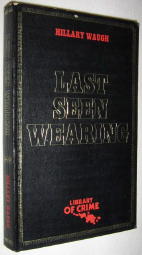Tue 30 Dec 2008
A 1001 MIDNIGHTS review: HILLARY WAUGH – The Con Game.
Posted by Steve under 1001 Midnights , Authors , Obituaries / Deaths Noted , ReviewsNo Comments
HILLARY WAUGH – The Con Game.
Doubleday Crime Club, hardcover, 1968. Paperback reprint: Popular Library, n.d. UK edition: Victor Gollancz, hc, 1986.

The novels of Hillary Waugh are characterized by tight plot lines that contain no superfluous action or complications. Each of his stories is lean, tense, and to the point, and it was this streamlined approach and good sense of structure that made Julian Symons select the 1952 novel Last Seen Wearing… for his list of the 100 greatest crime stories written up to 1959.
Over the past thirty-some years, Waugh — who is married to fellow suspense writer Shannon OCork — has created several series characters: private eyes Sheridan Wesley and Philip Macadam, who are both highly derivative of the Chandler/Hammett tradition; Lieutenant Frank Sessions of Manhattan’s Homicide North; and Police Chief Fred Fellows of Stockford, Connecticut.
Fellows, a down-to-earth, overweight cop and severe taskmaster, is probably the most appealing of these; and the small-town milieu is one Waugh knows well, since Stockford is very much like the Connecticut setting where Waugh grew up (although life there is definitely more fraught with peril than in New Haven).
The Con Game, Fellows’s eleventh case, is sharply evocative of the suburbs of the Sixties. Four couples have conspired to bribe elected officials in a land deal; now the $60,000 they have amassed to do so is missing, as are two of the conspirators, George and Dierdre Demarest.
Fellows’s job is to find them — and the money. His investigation reveals affairs, hopes of affairs, suspicions of affairs, revenge after affairs, and divorce because of affairs — in short, almost every kind of sexual misconduct in Stockford. And those citizens who are not motivated sexually are sure to be moved by greed.

Fellows treads carefully through this social minefield, trying to determine what each devious-minded person is hiding, but of course he cannot tread carefully enough. And before the case is over, he must use a creative method to determine the whereabouts of his quarry.
Fellows is an able police officer and a sympathetic character who employs not only good procedural methods but also the logical processes of classical detectives to get his woman or his man. Some of Waugh’s other books in this series are Sleep Long, My Love (1959), Born Victim (1962), and End of a Party (1965).
Among the Manhattan North novels are “30” Manhattan East (1968) and Finish Me Off (1970).
———
Reprinted with permission from 1001 Midnights, edited by Bill Pronzini & Marcia Muller and published by The Battered Silicon Dispatch Box, 2007. Copyright © 1986, 2007 by the Pronzini-Muller Family Trust.
HILLARY WAUGH, R.I.P. Although his obituary did not appear in the New York Times until last Friday, Mr. Waugh passed away earlier this month on December 8th. The obituary called him a “pioneer of the police procedural novel,” as indeed he was.
It ends by quoting him on the cardinal rule of mystery writing: “‘Authenticity is the key to good mystery writing,’ he told an interviewer. ‘Not only must you be able to write well, but you must also possess the instincts of a good reporter who has witnessed firsthand the darker side of human nature.'”